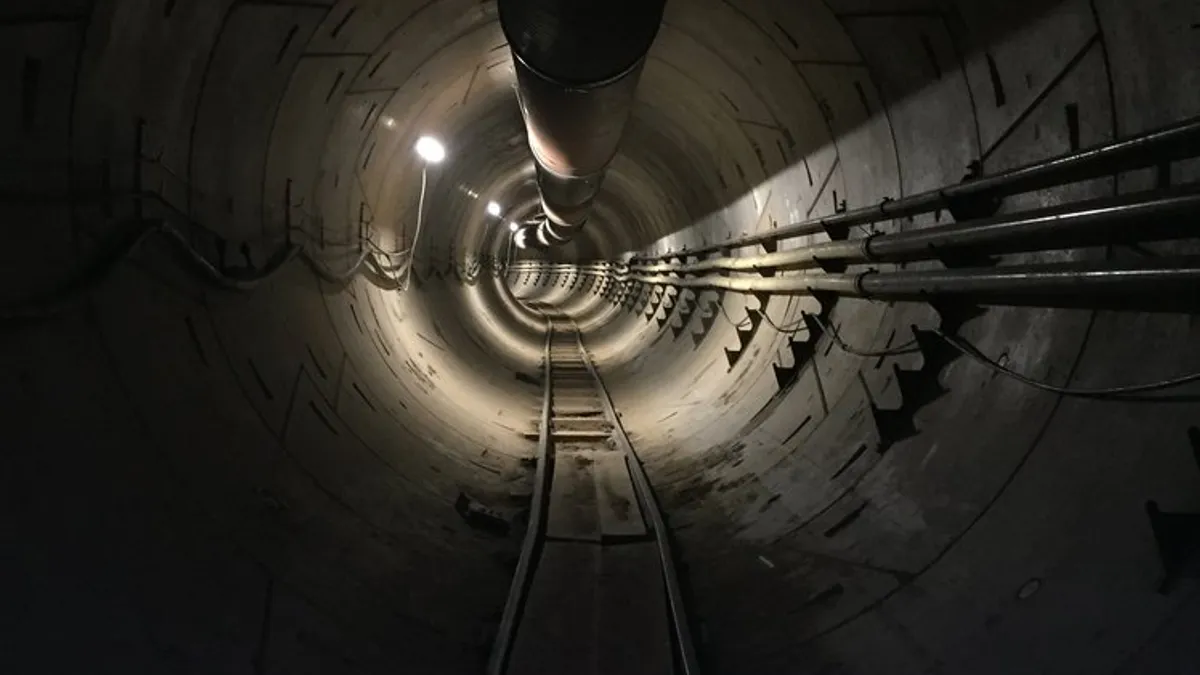Dive Brief:
- The City of Chicago has chosen Elon Musk's The Boring Company to build and operate a high-speed, underground express transportation line from downtown to O'Hare International Airport, which is about 15 miles away.
- The proposal involves autonomous electric vehicles that transport up to 16 riders traveling up to 150 miles per hour between the two destinations in about 12 minutes, compared with the current 45 minutes to an hour for that trip on the existing subway system. Vehicles would leave every 30 seconds, transporting a little less than 2,000 passengers per hour.
- The Boring Company will fund the entire project without any taxpayer dollars. Chicago City Council still has to approve the deal before contract negotiations can take place, but if approved, construction could start next year and possibly finish in three years.
Dive Insight:
According to Federal Aviation Administration (FAA) data, O'Hare is the third busiest airport in the U.S. behind Atlanta's Hartsfield-Jackson and Los Angeles International. The Airports Council International ranks O'Hare as the sixth busiest airport in the world, even ahead of London Heathrow and Hong Kong International.
Despite the airport's high passenger traffic numbers, only one of the Chicago Transit Authority's eight subway lines — collectively called the "L" by locals because the train system is mostly elevated — travels the approximately 15 miles to the airport. Plus, that line only serves a portion of the downtown "Loop" area and the western portion of the city, so riders coming from anywhere else in the city must transfer from other lines.
That becomes an arduous process for passengers with luggage considering that most of the L system is above ground and requires significant stair climbing. Few other viable transportation options exist for getting to O'Hare besides driving. And even though the airport is only about 15 miles from downtown, the nightmare that is Chicago traffic easily can cause the 30-minute minimum driving time for that route to balloon to an hour or longer.
The Boring Company hasn't yet devised a fare scale for the express service, but it claims the price will be more than the subway fare — currently $2.50 to O'Hare and $5.00 to return — but less than a taxi or ride-share, which varies greatly but typically runs $35-$50 one way.
The express service will operate in underground tunnels but not be as fast as a Hyperloop, so therefore it wouldn't operate in a vacuum. Still, it has the potential to revolutionize transportation in Chicago. The project will face plenty of hurdles, though, not the least of which is getting the public on board to use the innovation. Just the fact that this is a completely new type of transportation project that hasn't been implemented in the U.S. creates challenges for both testing and public acceptance. The Boring Company itself has only been in existence for about a year-and-a-half.
Another thing on skeptics' minds is that Musk, often called an idealist, has plentiful ideas and numerous project launches under his belt, but few have actually been executed or come to full fruition. Lawsuits are threatening The Boring Company's planned Los Angeles tunnel project, and so far nothing has come of the DC to Baltimore high-speed train project, despite Boring obtaining a work permit late last year.
However, if the Chicago project does stay on track for its projected completion in about three years, the timing could perfectly complement the recently approved $8.5 billion O'Hare airport expansion project.












